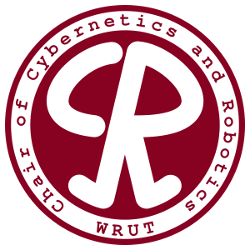
Department of Cybernetics and Robotics continues the tradition of the Unit of Fundamentals of Cybernetics and Robotics founded in 1973 by Professor Jerzy Jaroń. The Department was founded in 2014.
Research
The department conducts research in the field of cybernetics and robotics, with particular emphasis on modeling, control and motion planning of robots, systems theory, discrete events, perception, intelligence and operation of robots, electro- and mechanomiografic signal recognition, biocontrol, embedded systems for robotics, and human-robot interface. A new area of research activity of the Department is social robotics.
Research projects
The department has participated in the implementation of European and national research projects, such as LiREC (Living with Robots and Interactive Companions, 7th Framework Programme, 2008-2012), Re-Me-Di (Remote Medical Diagnostician, 7th Framework Programme, 2013-2016), RobRex (Autonomy for the rescue and exploration robots, NCBiR, 2012-2015), Development of jacobian robot motion planning algorithms (NCN, 2014-2016). Social robots constructed in the Department are ready for commercialization; Department is currently building a new model of the robot FLASH for Heriot-Watt University in Edinburgh and emotional EMYS heads for: the Museum of Science and Industry in Chicago, INESC-ID Lisbon and the American Association for People for the Ethical Treatment of Animals.
National and international cooperation
The national research cooperation includes the most important academic centers of robotics, Space Research Center, Medical Universities in Wrocław and Lublin, the Foundation for Cardiac Surgery Development in Zabrze, Industrial Research Institute for Automation and Measurements (PIAP), Office of Engineering and Design ACCREA (Lublin), Design Office CadMech (Wrocław). In the international scope the Department is working with the Department of the Technische Universität München, ETH Zurich, Scuola Superiore Sant'Anna, Heriot-Watt University, London South Bank University, INRIA Sophia Antipolis, Universitat Politecnica de Catalunya, Eötvös Loránd University, Otto-Friedrich Universität Bamberg, University of Lund, Technical University of Eindhoven, Carleton University, and Georgia Tech.
Research and teaching laboratories
The Department has four research and teaching laboratories:
Robotics Laboratory – designed primarily to teach the basics of robotics and automation, and specialized courses on manipulation and mobile robots, sensory systems, and microprocessor controllers.
Laboratory of biocontrol and mobile robots – activities include the study and analysis of electrical potentials and human muscle vibration, hand bio-prosthesis design, the design of mobile robots and navigation systems for autonomous vehicles.
Intelligence Laboratory robots – teaching and project work in the field of programming, operating systems, real-time systems, artificial intelligence, machine vision and robot control systems.
Laboratory of autonomous robots - enabling the education of students in the field of social and service robotics.
Courses taught
The Department is running two specialization programs within the field of Automation and Robotics (Faculty of Electronics): the Robotics (in Polish) and the Embedded Robotics (in English). The academic staff of 17 includes four professors. There are also 9 doctoral students. The Cybernetics and Robotics Seminar has been running continuously for over 40 years with over 1100 meetings.
Organizational activities
The Department regularly organizes the National Conferences of Robotics. The 14th Conference took place in 2016. The proceedings of the Conferences - over 30 volumes so far - reflect the complete picture of the development of Polish robotics in the last 30-year period.

